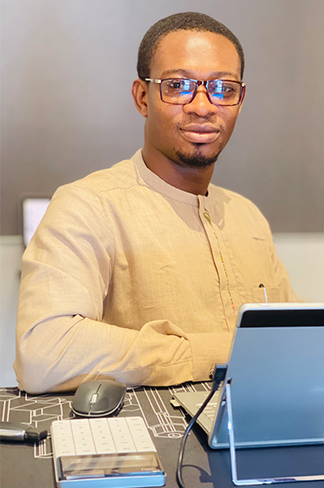Biometrics remains essential for sustaining democracy and digitisation of the African continent
About Abdul-Gamal Toure

Gamal spent six years working as a database administrator for the electoral register of Togo and Mali, one year as a manager of electoral agents in the field, and four years as an independent consultant. He’s carried out various missions within international organisations such as the OIF, the EU, and CENI-Guinea, all of which helped him understand the challenges of the electoral processes in multiple African countries.
In Africa, elections based around the use of biometric technology are often the first step to building robust digital solutions that are crucial for the development of African countries – not only in terms of fair democratic elections, but also in other ways. Digital identities provide long-term benefits in terms of financial inclusion, improved governance, and investment in human capital, as they promote and enable access to financial services for the poor as well as education and social protection programs.
There is still much to be done, however, as in several African countries digital technology is currently limited to just the development of electoral registers, whereas digital technology can also assist with many other aspects of the election process, such as the counting of votes – as is the case in the Democratic Republic of Congo – as well as providing the basis for the more widespread development mentioned above.
When it comes to building a reliable voters’ list, a combination of personal information and biometric fingerprints remains the most accurate method for the identification and verification of eligible voters in Africa, although facial recognition technology is often helpful as well, especially with regards to identifying minors who are ineligible to vote. Given its high-levels of accuracy and automation, through the use of biometrics it’s therefore much easier to avoid instances of voter fraud – such as multiple registrations, registering minors, or voting on behalf of the deceased.
When used optimally and efficiently, this means that biometrics can facilitate fair elections, and therefore improve the quality and legitimacy of a democracy. However, the efficiency aspect (or more specifically, the quality of the biometrics solution) is important, as biometrics based on weak data or using inefficient algorithms has been known to produce final electoral lists riddled with duplicates and inconsistencies. For example, if using facial recognition technology with reduced photo quality.
“Through the use of biometrics it’s much easier to avoid instances of voter fraud – such as multiple registrations, registering minors, or voting on behalf of the deceased.”
Even though biometrics has already been used to facilitate election processes all over the African continent, issues still sometimes emerge. Some of these issues are not directly connected to the technology, but rather to poor electoral zoning or organisation that causes voters to find themselves missing from the voting lists on election day.
However, there are also issues linked to the process of capturing and using biometric data. For example, we sometimes have to deal with the loss of data such as personal information or fingerprints, due to defective kits used when collecting the data from the citizens, or failed data imports to the central server. Attacks in conflict zones can also result in data kits being stolen or damaged. This can all cause eligible citizens to be unintentionally stripped of their right to vote. Plus, beyond the issues related to the logistics of the electoral process, others simply choose not to vote because they no longer have confidence in the institutions of their country.
To overcome all these obstacles, we carry joint missions with the Ministry of Territorial Administration to update the electoral zoning, negotiate with the armed groups to recover stolen kits, and take measures together with the service providers to anticipate the recovery of data in case of problems with defective kits and/or with the central server. The institutions help by raising public awareness and emphasising the benefits of elections. Nevertheless, there is still a lot of work to do.
To make the electoral process optimal in each country, we need to take into account the constraints and realities of the country in question before we start thinking about the type of identification we want to use. The fingerprint is certainly reliable in theory, but in reality we can face cases of amputated fingers or fingerprints with very low scores. Some African customs also prohibit taking photos of certain groups of people, making it difficult for facial recognition to reach its full potential.
In any case, biometric technology remains essential in the electoral process in Africa because it allows for the unique, more-accurate identification of voters, which creates a fairer opportunity for each voter to have their say in choosing the leaders of their respective country. Biometrics helps to enforce the law that grants voting rights to all citizens in Africa.








